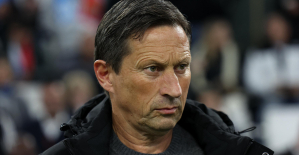It's not a sure thing, judging by his record as president. Biden is trying for the international alliance that he has not been able to achieve on his domestic agenda, as he faces defeats over voting rights and his $2.2 trillion domestic climate and spending bill.
He now faces a complex and more dangerous task: keeping West united as it faces what White House officials call an increasing likely further invasion by Russian President Vladimir Putin of Ukrainian territory.
This slew of challenging moments is a major test for Biden's twin pillars: That he can get things done at home competently and that America's standing in world after Donald Trump’s volatile four years as President.
"Having started with the messy ending of the war in Afghanistan at the end of summer, and the rise in COVID cases into fall, overlaid with economic concerns and labor shortages, and his issues regarding his legislative agenda, Biden has found himself with an exhausted American public who are seeing a lot of unfulfilled promises," stated Christopher Borick, director of Muhlenberg College's Institute of Public Opinion. His competence is being tested again by the situation in Ukraine.
Biden has already seen his public support slide and this is the latest crisis.
About 25% of Americans don't trust Biden enough to manage the military effectively or improve the U.S. position in the world. According to an Associated Press/NORC Center for Public Affairs Research poll, close to 4 out 10 Americans have very little faith in Biden in these areas. According to the poll, Democrats are less likely to claim that they have "a lot of confidence" than when he took office (48% vs. 65%)
Officials from the Administration have tried to reach consensus among NATO allies in order to prevent a Russian attack.
Biden's national security advisers worked with European countries, the European Commission, and global suppliers to develop contingency plans in case Russia disrupts energy supplies.
He has repeatedly stated that he won't send U.S. soldiers to Ukraine. He has however ordered that 8,500 be placed on high alert for deployments to the Baltic Region. He warned of "enormous" consequences and severe sanctions for Russia, as well as Putin personally, if Russia launches military action against Ukraine.
He stated that he had spoken to every NATO ally and "we're all on one page."
Biden claims that there is "total unity" in the Western alliance's response to the crisis. There are however signs of disagreements.
Despite the fact that NATO allies and the U.S. sent military aid to Ukraine, Germany refused to send any military aid. However, it did look to help Kyiv more. Germans claimed that this aid could increase tensions.
Volodymyr Zelenskyy, the Ukrainian president, was furious at Biden's comments last week about a "minor invasion" of Ukraine that would have more limited consequences for Moscow. President Obama and the White House quickly clarified that Russia would be subject to severe sanctions if it invades Ukrainian territory. Ukrainian officials complained that the U.S. State Department was too slow in asking families of American Embassy workers to leave Ukraine.
French President Emmanuel Macron stated Tuesday that it was a good thing that Russia and the United States had been talking. However, he said he didn't see any concrete results. Macron stated that he would speak with Putin directly on Friday
Meanwhile, President Zoran Milanovic of Croatia blamed the escalation in tensions on the Biden administration as well as the pressure from "hawks", on both sides. Croatia is a NATO member and its troops have participated in NATO's missions overseas.
Biden's challenge in trying to manage a global community of people with different perspectives and motivations is similar to the one he faces at home. He has had to deal with the realities of a 50-50 Senate, and a Democratic coalition that doesn't always see eye-2-eye.
The stakes for Biden, and the world, are potentially greater as he attempts to assert American leadership after Europe turned inward during Trump's years.
Biden has been criticised by Republican lawmakers for pushing for preemptive sanctions to be imposed against Moscow, at home as the crisis has grown in recent weeks. Biden claims that the U.S. has already made it clear to Russia that sanctions will be severe and unprecedented, but officials claim that Russia would not hesitate to retaliate if they preemptively act.
Skeptical Republicans sought to remind voters of Biden's decision to lift sanctions last year against Russia-to-Germany Nord Stream 2 pipeline.
The United States argued for years that the pipeline project would pose a threat to European energy security. It would increase Europe's dependence on Russian gas and allow Russia to exert political pressure upon vulnerable countries in Eastern and Central Europe, especially Ukraine.
Biden raised concerns about the pipeline as a vice president and announced last year that he would lift sanctions on German entities due to the damage they could do to U.S.-German relations.
Ted Cruz, Republican Senator from Texas, attempted to impose sanctions against the pipeline earlier this month, but it was unsuccessful. The pipeline is still in operation, though it has been completed. Other administration officials and Secretary of State Antony Blinken have stated that it is unlikely that gas will flow through this pipeline if Russia invades.
Tommy Pigott, spokesperson for the Republican National Committee, stated that "Biden ignored its own advice and gave Putin a major geopolitical victory by waiving sanctions against his pipeline."
Officials from the White House argued that the GOP's criticism should not be taken seriously after Trump failed to drastically reduce the U.S. troop presence on European soil in his last months of office. They viewed it as encouraging Russian aggression in the region.
Senator Republican Leader Mitch McConnell offered some support Tuesday for President Biden, who had previously criticised the Biden administration's inability to take preemptive actions against Moscow. Senator McConnell called it "encouraging" to see Biden increase military aid and put U.S. troops in heightened alert for deployments to NATO allies at the Baltics.
McConnell stated that McConnell believes the administration is moving in a positive direction.

 Sydney: Assyrian bishop stabbed, conservative TikToker outspoken on Islam
Sydney: Assyrian bishop stabbed, conservative TikToker outspoken on Islam Torrential rains in Dubai: “The event is so intense that we cannot find analogues in our databases”
Torrential rains in Dubai: “The event is so intense that we cannot find analogues in our databases” Rishi Sunak wants a tobacco-free UK
Rishi Sunak wants a tobacco-free UK In Africa, the number of millionaires will boom over the next ten years
In Africa, the number of millionaires will boom over the next ten years Can relaxation, sophrology and meditation help with insomnia?
Can relaxation, sophrology and meditation help with insomnia? WHO concerned about spread of H5N1 avian flu to new species, including humans
WHO concerned about spread of H5N1 avian flu to new species, including humans New generation mosquito nets prove much more effective against malaria
New generation mosquito nets prove much more effective against malaria Covid-19: everything you need to know about the new vaccination campaign which is starting
Covid-19: everything you need to know about the new vaccination campaign which is starting For the Olympics, SNCF is developing an instant translation application
For the Olympics, SNCF is developing an instant translation application La Poste deploys mobile post office trucks in 5 rural departments
La Poste deploys mobile post office trucks in 5 rural departments Meta accelerates into generative artificial intelligence with Llama 3
Meta accelerates into generative artificial intelligence with Llama 3 In China, Apple forced to withdraw WhatsApp and Threads applications at the request of the authorities
In China, Apple forced to withdraw WhatsApp and Threads applications at the request of the authorities The main facade of the old Copenhagen Stock Exchange collapsed, two days after the fire started
The main facade of the old Copenhagen Stock Exchange collapsed, two days after the fire started Alain Delon decorated by Ukraine for his support in the conflict against Russia
Alain Delon decorated by Ukraine for his support in the conflict against Russia Who’s Who launches the first edition of its literary prize
Who’s Who launches the first edition of its literary prize Sylvain Amic appointed to the Musée d’Orsay to replace Christophe Leribault
Sylvain Amic appointed to the Musée d’Orsay to replace Christophe Leribault Skoda Kodiaq 2024: a 'beast' plug-in hybrid SUV
Skoda Kodiaq 2024: a 'beast' plug-in hybrid SUV Tesla launches a new Model Y with 600 km of autonomy at a "more accessible price"
Tesla launches a new Model Y with 600 km of autonomy at a "more accessible price" The 10 best-selling cars in March 2024 in Spain: sales fall due to Easter
The 10 best-selling cars in March 2024 in Spain: sales fall due to Easter A private jet company buys more than 100 flying cars
A private jet company buys more than 100 flying cars This is how housing prices have changed in Spain in the last decade
This is how housing prices have changed in Spain in the last decade The home mortgage firm drops 10% in January and interest soars to 3.46%
The home mortgage firm drops 10% in January and interest soars to 3.46% The jewel of the Rocío de Nagüeles urbanization: a dream villa in Marbella
The jewel of the Rocío de Nagüeles urbanization: a dream villa in Marbella Rental prices grow by 7.3% in February: where does it go up and where does it go down?
Rental prices grow by 7.3% in February: where does it go up and where does it go down? With the promise of a “real burst of authority”, Gabriel Attal provokes the ire of the opposition
With the promise of a “real burst of authority”, Gabriel Attal provokes the ire of the opposition Europeans: the schedule of debates to follow between now and June 9
Europeans: the schedule of debates to follow between now and June 9 Europeans: “In France, there is a left and there is a right,” assures Bellamy
Europeans: “In France, there is a left and there is a right,” assures Bellamy During the night of the economy, the right points out the budgetary flaws of the macronie
During the night of the economy, the right points out the budgetary flaws of the macronie These French cities that will boycott the World Cup in Qatar
These French cities that will boycott the World Cup in Qatar Europa League: “We dream of everything,” says Jean-Louis Gasset
Europa League: “We dream of everything,” says Jean-Louis Gasset Europa League: “Trouble playing our football,” admits Benfica coach
Europa League: “Trouble playing our football,” admits Benfica coach Europa League Conference: “Martinez eats all your deaths”, Obraniak’s breakdown after the elimination of Lille
Europa League Conference: “Martinez eats all your deaths”, Obraniak’s breakdown after the elimination of Lille Premier League: “It’s a team that is transforming into the Champions League”, Casemiro returned to Real’s qualification
Premier League: “It’s a team that is transforming into the Champions League”, Casemiro returned to Real’s qualification


















